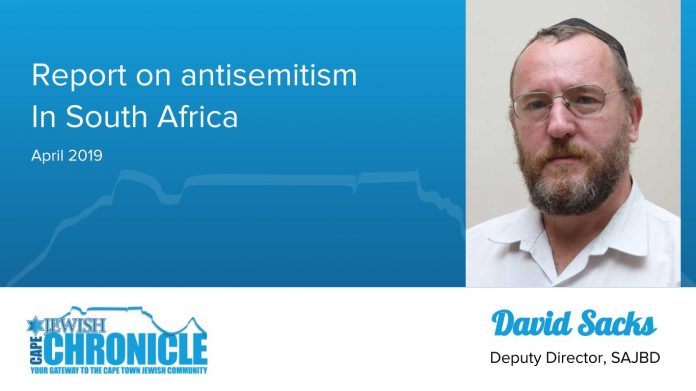South Africa has recorded a fair rise in antisemitic incidents in 2018 compared with the previous two years. While naturally a cause for concern, it nevertheless remains true that even with the increased figure, antisemitism in this country continues to manifest at a strikingly lower level than in other major Diaspora centres.
Annual incidents continue to be numbered in the few dozens, as opposed to in the hundreds and sometimes even in the thousands elsewhere in the Diaspora. The nature of the incidents taking place on the local front is also significant. Overwhelmingly, such acts take the form of verbal or written rather than physical abuse, with serious cases of assault, as well as of vandalism, occurring very rarely (in 2018, only one case of each was reported, compared with UK figures for the same period of 123 and 78).
In February, thousands of protestors across France demonstrated against the continued rise of antisemitism in the country. The immediate cause of the protests was the desecration of a Jewish cemetery in eastern France, where Nazi symbols and other graffiti were daubed on some 80 gravestones. According to French authorities, the country saw a 74% increase in antisemitic incidents last year. At least 11 people have been killed in antisemitic violence in France since 2016.
Elsewhere in Europe, the situation is also deteriorating at an alarming rate. In the UK, a very bitter and divisive controversy over antisemitism in the opposition Labour Party played a significant role in the resignation last month of eight Labour MPs. The number of antisemitic incidents recorded in the country in 2018 rose to 1652, the highest on record. 123 of the incidents involved physical violence.
A survey of Dutch Jews conducted towards the end of 2018 showed almost half of respondents saying that they took steps to hide their ethnic heritage. One in three reported having experienced antisemitic remarks directed against them and one in ten said they had personally been the victims of antisemitic violence.
Surveys have shown very similar responses by Jews in Scandinavian countries, for all the latter’s well-established credentials as ultra-liberal democracies and the relatively few numbers of Jews living there. Indeed, a curious feature of the new wave of antisemitism that has emerged in Europe since the beginning of the century is that its most serious manifestations have been in the Western democratic states rather than in Central and Eastern European countries, which tend to be more authoritarian and right-leaning.
Further afield, incidents in Canada once more exceeded the 1500-mark, and while the total for Australia in 2018 remained in the low hundreds, it nevertheless marked an unprecedented 60% rise from the previous year. Attacks against the Jewish community of Buenos Aires, Argentina, made up 24% of the 215 complaints in 2017, up from 22% the previous year.
At the start of the new millennium, many influential commentators considered antisemitism to be a diminishing problem, one that was likely to diminish further as the world proceeded further into a hopeful new era of burgeoning democracy.
Two key factors in this general mood of positivity was the collapse of the Soviet Union, prior to that one of the foremost propagators of antisemitism on the international stage, and the apparent progress being made in the Oslo peace process.
All of this changed abruptly in September 2000, when the then Palestinian leadership jettisoned negotiations in favour of a sustained campaign of terrorist violence that continues, if at a lower level, to this day. One of the results of this has been an alarming resurgence of antisemitism worldwide. Throughout the Diaspora, anti-Jewish attacks, including multiple acts of violence and damage and desecration to property have risen steadily. The revolution in electronic communications has further facilitated the spread of anti-Jewish hatred.
Dealing with this new threat has become perhaps the most urgent issue that global Jewry, with the growing participation of the international community, today has to deal with.
We need to take this seriously, but we must nevertheless be careful not to overstate the problem, such as by invoking comparisons with earlier eras where Jews were vulnerable to serious persecution.
A century ago, a large majority of Jews lived in authoritarian states where the laws of their very society discriminated against them. Today, nearly all Jews live in democratic countries where they enjoy full equality and legal protection. Antisemitic manifestations within the broader population, while widespread, at least are strongly condemned by the governments of the day.
The lesson we should take from all of this is that while antisemitism exists in South Africa and needs constant vigilance, the extent to which it poses a threat to our community remains thankfully fairly limited.
Our community needs to be able to deal with it as it arises while at the same time keeping the problem in perspective.
South Africa today is struggling to deal with many critical problems, and its people are gripped by a pervasive mood of pessimism and despondency. At such times, we can and should take heart over how it nevertheless remains far in advance of most developed countries in terms of the position of its Jewish citizens.
Click here to visit the SA Jewish Board of Deputies website
Click here to download a PDF of the April edition of the Chronicle











Thank you. This is useful.